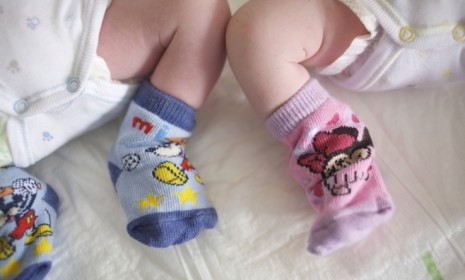The rise of child sex-change treatments
More doctors than ever are using hormone therapy to treat kids suffering from gender identity disorder. The question is, should they?

A free daily email with the biggest news stories of the day – and the best features from TheWeek.com
You are now subscribed
Your newsletter sign-up was successful
Gender identity disorder (GID) is a rare diagnosis given to young people who believe they were born into the wrong sex. Estimates suggest that 1 in 10,000 children may have the condition, and new reports published in the journal Pediatrics say parents and doctors are increasingly willing to administer sex-changing drugs as early as age 16 to make the transition as smooth as possible. Here, a guide to the "emerging" practice and its murky ethical considerations:
What happens when a child has GID?
Take the case of 5-year old Zach Avery, who, at age of 3, decided that he wanted to live as a girl. The child became obsessed with wearing girls' clothing and with TV characters like Dora the Explorer. At first, his parents thought it was a phase, but things became serious when "he would become upset if anyone referred to him as a boy," Zach's mother, Theresa Avery, tells Britain's Telegraph. "He used to cry and try to cut off his willy out of frustration." Doctors diagnosed Zach with GID, making him the youngest person on record with the diagnosis in the United Kingdom. "They told us that although he had a male body, his brain was telling him he was a girl," she said.
The Week
Escape your echo chamber. Get the facts behind the news, plus analysis from multiple perspectives.

Sign up for The Week's Free Newsletters
From our morning news briefing to a weekly Good News Newsletter, get the best of The Week delivered directly to your inbox.
From our morning news briefing to a weekly Good News Newsletter, get the best of The Week delivered directly to your inbox.
What dangers do GID patients face?
"Young people who believe they were born into the wrong sex are at risk for abuse, post-traumatic stress, and self-harming behavior," says Zalman S. Agus at Medpage Today. According to a recent study by the Harvard School of Public Health published in the journal Pediatrics, 39 percent of women facing gender uncertainty experienced some type of abuse when they were younger, as did 30 percent of men. Among children and teens evaluated for treatment, 44 percent have been given a psychiatric diagnosis ("most often depression"), and 21 percent reported self-mutilation.
How are doctors treating these children?
They're prescribing young GID patients with puberty-blocking drugs until age 16, as recommended in guidelines from the Endocrine Society. Then doctors begin lifelong treatment with sex-changing hormones, while monitoring for potential health risks. The guidelines recommend the aid of mental health professionals throughout the process.
A free daily email with the biggest news stories of the day – and the best features from TheWeek.com
And this is a growing trend?
According to one study, a Boston hospital reported a big jump in patients at its Gender Management Service clinic in recent years. The facility now averages about 19 patients a year, up from about four in the late 1990s. And a similar trend is happening across the pond: From 2009 to 2010, the Tavistock Patman Foundation Trust clinic, a national body for GID in the U.K., had 97 referrals for treatment. But in 2010 to 2011, the number was up to 165.
What do health-care experts think?
Some say that treating children at the first sign of puberty raises ethnical concerns. Dr. Margaret Moon, a member of the American Academy of Pediatrics' bioethics committee, says it's damaging to "have irreversible treatment too early" in a child's life. Some doctors, however, say that withholding hormone therapy is more harmful in the long run (children sometimes resort to self-mutilation or castration, for example). Transgender kids are "one of the most discriminated-against groups in the country," says Jared Spurbeck at Yahoo. "The parents who are helping their kids go through with it understand this, and are doing their best to make things as painless as possible."
Sources: Associated Press, Live Science, Medpage Today, News.com.au, Telegraph, Yahoo
-
 Trump wants a weaker dollar but economists aren’t so sure
Trump wants a weaker dollar but economists aren’t so sureTalking Points A weaker dollar can make imports more expensive but also boost gold
-
 Political cartoons for February 3
Political cartoons for February 3Cartoons Tuesday’s political cartoons include empty seats, the worst of the worst of bunnies, and more
-
 Trump’s Kennedy Center closure plan draws ire
Trump’s Kennedy Center closure plan draws ireSpeed Read Trump said he will close the center for two years for ‘renovations’